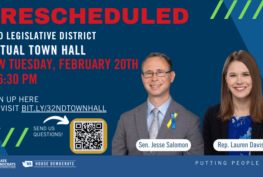Dear friends:
During a legislative session, the bigger bills tend to draw lots of media attention while smaller bills get little or none — but some of those “little” bills can make big improvements in people’s everyday lives.
It’s common knowledge, for instance, that we generally pay much more for prescription drugs than people in other countries, often for no good reason. Insulin, as just one example, is a commonly used drug that hasn’t been significantly changed since its development decades ago. Yet the price of this life-saving drug has gone up by more than 50 percent in recent years, costing some people more than $1,200 a month to manage their diabetes. SB 5546 will cap people’s out-of-pocket payments for insulin at $35 a month, improving on legislation passed in 2020 that capped the cost at $100 a month. That legislation expires on Jan. 1, 2023, which is when the new, lower cap will take effect.
A second bill, SB 5532, will establish a Prescription Drug Affordability Board to identify excessively priced drugs and impose caps on patients’ out-of-pocket costs. And a third bill, HB 1675, will make dialysis more affordable. Together, these bills will make a huge difference every day in the lives of people who are struggling to pay for their medications.
Another bill would help people who are receiving long-term care under Medicaid but must pay for a portion of the care because they have a source of income. Recognizing that people need money for necessities such as food, clothes and toiletries, the state allows them to keep a portion of that income. That currently comes to about $1,074 per month for a single person. SB 5745 will more than double the amount allowed, to about $2,300, to help seniors make ends meet while receiving long-term care through Medicaid.
Speaking of long-term care, this is a rapidly growing concern for most households. With people living longer and Baby Boomers entering their later years, more people are discovering the need for long-term care, whether for themselves or for family members — and being bankrupted by it. While 75 percent of people over 65 require long-term care, only 25 percent believe they have the ability to afford it. Care is available through Medicaid, but recipients must spend down their savings or other assets in order to qualify.
No one should have to spend themselves into poverty in order to receive health care—and the state’s Washington Cares Trust was created last year to help people afford such care. But as often happens with new programs, issues arose around implementation that we addressed with two bills this session.
HB 1732 delays implementation of the state program for 18 months to ease implementation for businesses and employees. HB 1733 creates exemptions for people who don’t have the need for, or ability to access, the program’s benefits, such as military spouses, disabled veterans, border-state residents and non-immigrant visa holders.
All but one of these bills – SB 5745, which passed the Senate and is still moving through the House – have passed the full Legislature, with several already signed into law by Gov. Inslee. And all of them will bring life-changing help to households across our state.
Sincerely,





